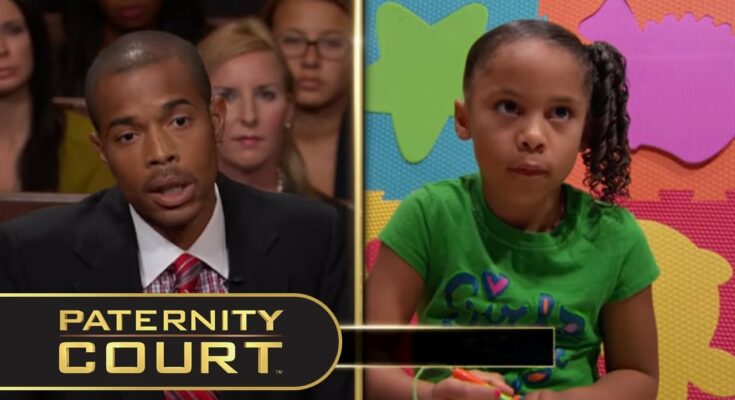The episode revolves around a complex and emotionally charged case between two individuals, Mr. Matlock and Ms. Monroe. The two were in a relationship when Mr. Matlock was suddenly called away on family business. During his absence, Ms. Monroe invited her former lover to move into their family home. Upon his return, Mr. Matlock forgave her and resumed their sexual relationship. However, Ms. Monroe dropped a bombshell – she was pregnant, and Mr. Matlock might not be the father of her child.
Ms. Monroe admits to having serious doubts about the paternity of her child. She argues that when Mr. Matlock left on family business, he stopped answering her phone calls and texts for an entire month. In her defense, she believed he was never coming back, leading her to invite her ex into their home. This decision, however, would lead to a series of events that would change their lives forever.
The dispute takes a turn when Mr. Matlock confronts Ms. Monroe about the paternity of the child. He recounts asking her point-blank if he was the father of the child. To his shock, she responded, “You are not the father.” This revelation led him to decide not to take care of a child that might not be his.
The situation escalates further when Mr. Matlock ends up in jail for child support because his son’s mother claimed he wasn’t paying child support. This happened despite him paying child support and even sending a picture of the baby to her when he first found out that he might have another child. This incident adds another layer of complexity to the dispute, highlighting the legal implications and consequences of paternity disputes.
The climax of the episode comes when Judge Lake reveals the results of the paternity test. She announces, “When it comes to five-year-old Kenya Monroe, Mr. Matlock, the wait is over, you are not the father.” This revelation brings a wave of relief to Mr. Matlock, who had been working triple shifts to pay child support. The audience erupts in cheers, and Mr. Matlock breathes a sigh of relief, knowing that he is not the biological father of Kenya.
In the aftermath of the announcement, Ms. Monroe expresses her regret and relief. She admits, “I wanted him to be the father, because… He’s more responsible. I’m sorry that I put you through all this. I know you hurt. It’s all right. We handled it. We still good. Okay. We still good. Come on. I’m just happy we came on Paternity Court to get it settled.”
The episode concludes on a somber note, with Ms. Monroe expressing her regret for the situation and Mr. Matlock expressing his relief at the outcome. Despite the emotional turmoil and legal complications, both parties express their desire to move forward and learn from the experience.
In conclusion, this episode of Paternity Court provides a compelling exploration of a complex paternity dispute, offering valuable insights into the dynamics of such disputes and the role of the court in resolving them. It serves as a stark reminder of the importance of truth, honesty, and responsibility in relationships and the devastating consequences when these values are compromised. It also underscores the critical role of DNA testing in establishing biological relationships and bringing closure to such disputes. Despite the emotional turmoil and heartbreak, the episode ends on ahopeful note, with the court offering support and guidance to the parties involved, signaling a new beginning in the wake of a painful past.
The episode is a poignant reminder of the complexities of human relationships and the devastating impact of deceit and betrayal. It highlights the importance of honesty and integrity in relationships and the devastating consequences when these values are compromised. The emotional turmoil experienced by all parties involved is palpable, and the episode serves as a stark reminder of the importance of truth and honesty in all aspects of life.
The episode also underscores the importance of DNA testing in resolving disputes over paternity. The DNA test results provide irrefutable evidence of the biological relationship between the child and the alleged father, bringing a sense of closure to the parties involved. However, the revelation also brings with it a wave of emotions, as the truth may not always align with what the parties had hoped for or believed.
The episode also highlights the role of the court in mediating such disputes and ensuring that the truth is uncovered. The judge, in this case, plays a crucial role in maintaining order in the courtroom, ensuring that all parties are heard, and delivering the final verdict based on the evidence presented. The judge’s decision is not just about determining the biological father of the child but also about addressing the underlying issues of trust, betrayal, and responsibility.
The episode ends on a somber note, with the court expressing sympathy for Mr. Matlock’s situation and offering support from Dr. Jeff, a professional counselor. This gesture underscores the court’s recognition of the emotional toll that such disputes can take on the parties involved and its commitment to ensuring that they receive the necessary support to cope with the aftermath.
In conclusion, this episode of Paternity Court provides a compelling exploration of a complex paternity dispute, offering valuable insights into the dynamics of such disputes and the role of the court in resolving them. It serves as a stark reminder of the importance of truth, honesty, and responsibility in relationships and the devastating consequences when these values are compromised. It also underscores the critical role of DNA testing in establishing biological relationships and bringing closure to such disputes. Despite the emotional turmoil and heartbreak, the episode ends on a hopeful note, with the court offering support and guidance to the parties involved, signaling a new beginning in the wake of a painful past.



